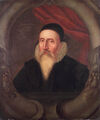Template:Selected anniversaries/July 13: Difference between revisions
No edit summary |
No edit summary |
||
| Line 36: | Line 36: | ||
||1964: Kurt Diebner dies ... nuclear physicist who is well known for directing and administrating the German nuclear energy project, a secretive program aiming to build nuclear weapons for Nazi Germany during the course of World War II. Pic. | ||1964: Kurt Diebner dies ... nuclear physicist who is well known for directing and administrating the German nuclear energy project, a secretive program aiming to build nuclear weapons for Nazi Germany during the course of World War II. Pic. | ||
||1970: Leslie Groves dies ... American general and engineer | ||1970: Leslie Groves dies ... American general and engineer. Pic. | ||
File:Skip Digits, Conductor.jpg|link=Skip Digits, Conductor|1972: Signed first edition of ''[[Skip Digits, Conductor]]'' sells for one million dollars; House Democrats say money trail leads to Richard Nixon. | File:Skip Digits, Conductor.jpg|link=Skip Digits, Conductor|1972: Signed first edition of ''[[Skip Digits, Conductor]]'' sells for one million dollars; House Democrats say money trail leads to Richard Nixon. | ||
| Line 42: | Line 42: | ||
File:Nixon April-29-1974.jpg|link=Watergate scandal (nonfiction)|1973: [[Watergate scandal (nonfiction)]]: Alexander Butterfield reveals the existence of the "Nixon tapes" to the special Senate committee investigating the [[Watergate scandal (nonfiction)|Watergate break-in]]. | File:Nixon April-29-1974.jpg|link=Watergate scandal (nonfiction)|1973: [[Watergate scandal (nonfiction)]]: Alexander Butterfield reveals the existence of the "Nixon tapes" to the special Senate committee investigating the [[Watergate scandal (nonfiction)|Watergate break-in]]. | ||
||1974: Patrick Blackett dies ... physicist and academic, Nobel Prize laureate. | ||1974: Patrick Blackett dies ... physicist and academic, Nobel Prize laureate. Pic. | ||
File:Hilary Putnam.jpg|link=Hilary Putnam (nonfiction)|1974: Mathematician and crime-fighter [[Hilary Putnam (nonfiction)|Hilary Putnam]] publishes his landmark paper arguing that mathematics is not purely logical, but "quasi-empirical", and that we should beware the possibility of "[[Crimes against mathematical constants|quasi-empirical crimes]]". | File:Hilary Putnam.jpg|link=Hilary Putnam (nonfiction)|1974: Mathematician and crime-fighter [[Hilary Putnam (nonfiction)|Hilary Putnam]] publishes his landmark paper arguing that mathematics is not purely logical, but "quasi-empirical", and that we should beware the possibility of "[[Crimes against mathematical constants|quasi-empirical crimes]]". | ||
||1983: Gabrielle Roy dies ... engineer (?) and author ... There is a quotation by her on the back of the Canadian $20 bill that reads: "Could we ever know each other in the slightest without the arts?" | ||1983: Gabrielle Roy dies ... engineer (?) and author ... There is a quotation by her on the back of the Canadian $20 bill that reads: "Could we ever know each other in the slightest without the arts?" Pic. | ||
File:Blue City Sunset.jpg|link=Blue City Sunset (nonfiction)|2015: Steganographic analysis of ''[[Blue City Sunset (nonfiction)|Blue City Sunset]]'' reveals "five hundred kilobytes, perhaps six hundred" of previously unknown [[Gnomon algorithm]] functions. | File:Blue City Sunset.jpg|link=Blue City Sunset (nonfiction)|2015: Steganographic analysis of ''[[Blue City Sunset (nonfiction)|Blue City Sunset]]'' reveals "five hundred kilobytes, perhaps six hundred" of previously unknown [[Gnomon algorithm]] functions. | ||
Revision as of 13:58, 23 January 2019
100 BC: Roman general and statesman Julius Caesar born. He will play a critical role in the events that led to the demise of the Roman Republic and the rise of the Roman Empire.
1527: Mathematician, astronomer, and astrologer John Dee born. He will achieve high status as a scholar and play a role in Elizabethan politics.
1956 – John McCarthy (Dartmouth College), Marvin Minsky (MIT), Claude Shannon (Bell Labs), and Nathaniel Rochester (IBM) assemble the first coordinated research meeting on the topic of "Artificial intelligence" at Dartmouth College in Hanover, NH. USA.
1972: Signed first edition of Skip Digits, Conductor sells for one million dollars; House Democrats say money trail leads to Richard Nixon.
1973: Watergate scandal (nonfiction): Alexander Butterfield reveals the existence of the "Nixon tapes" to the special Senate committee investigating the Watergate break-in.
1974: Mathematician and crime-fighter Hilary Putnam publishes his landmark paper arguing that mathematics is not purely logical, but "quasi-empirical", and that we should beware the possibility of "quasi-empirical crimes".
2015: Steganographic analysis of Blue City Sunset reveals "five hundred kilobytes, perhaps six hundred" of previously unknown Gnomon algorithm functions.






